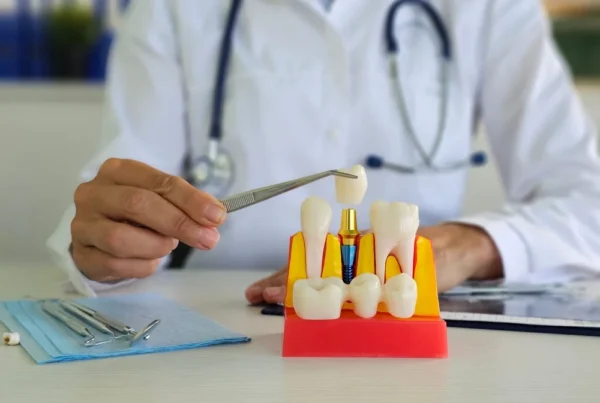Dental implant recovery can be a smooth process with the right knowledge. This guide covers essential tips for a successful recovery, including what to eat, how to manage discomfort, and proper oral care techniques. By following these guidelines, you’ll be well-equipped to navigate the healing process and achieve the best results from your dental implant procedure.
Key Takeaways
- Dental implant recovery involves managing swelling and discomfort with medication and proper oral hygiene
- Soft foods, smoothies, and soups are recommended during the initial healing phase
- Regular follow-up appointments are crucial for monitoring implant integration and addressing concerns
- Staying hydrated and using ice packs can help manage discomfort during recovery
- Complete dental implant recovery, including bone integration, can take a few months
Understand the Initial Stages of Dental Implant Recovery
The initial stages of dental implant recovery involve key aspects patients should understand. Expect swelling and discomfort in the first few days, which can be managed with prescribed medication for pain and inflammation relief. Maintaining optimal oral hygiene without disturbing the implant site is crucial. These steps help ensure proper healing of the gums and crown, reducing the risk of disease or complications. For more information, contact us to achieve my brand new smile.
Experience Swelling and Discomfort During the First Few Days
Following dental implant surgery, patients typically experience swelling and discomfort for the first few days. This is a normal part of the healing process as the body responds to the implant placement. Dr. Wu recommends using cold compresses and taking prescribed pain medication to manage these symptoms effectively. Patients should also be mindful of their oral hygiene routine during this time, being gentle around the implant site to promote proper healing and following all of Dr. Wu’s home care instructions.
Follow Prescribed Medication for Pain and Inflammation Relief
Dr. Wu at ReNEW Dental emphasizes the importance of following prescribed medication for pain and inflammation relief during dental implant recovery. The dental office provides specific instructions for taking antibiotics and pain relievers to manage discomfort and promote healing after tooth loss treatment. Patients should adhere to the prescribed dosage and schedule to ensure optimal health outcomes and support the body’s natural healing process. This approach helps minimize complications and supports successful dental implant integration.
Maintain Optimal Oral Hygiene Without Disturbing the Implant
Maintaining optimal oral hygiene without disturbing the implant is crucial during the initial stages of dental implant recovery. Dr. Wu advises patients to gently brush their teeth, being careful around the implant site, and to use a prescribed antimicrobial mouthwash. The American Dental Association recommends avoiding hard or sticky foods that could interfere with healing. Regular exams at ReNEW Dental help monitor progress and prevent tooth decay. For patients with anxiety, sedation options are available to ensure comfort during these check-ups:
| Recovery Stage | Hygiene Practice | Precautions |
| Initial Days | Gentle brushing, antimicrobial rinse | Avoid implant area |
| First Week | Saltwater rinses, soft diet | No smoking or alcohol |
| Weeks 2-4 | Resume normal brushing | Avoid strenuous activity |
Know the Best Foods to Eat After Dental Implant Surgery
Proper nutrition plays a crucial role in dental implant recovery. Dr. Wu recommends soft foods to avoid irritating the implant site in the jaw. Smoothies and soups provide balanced nutrition during healing, while patients should steer clear of hard, crunchy, or sticky foods. These dietary choices support the integration of the titanium root and promote overall dental care for Tewksbury patients.
Choose Soft Foods to Avoid Irritation at the Implant Site
After dental implant surgery, patients should opt for soft foods to minimize irritation at the implant site. Dr. Wu recommends foods like mashed potatoes, yogurt, and well-cooked vegetables that are easy to chew and swallow. These choices help protect the surgical area and support healing, especially important for those with dental insurance covering the procedure. Patients should avoid hard or crunchy foods that could disturb the implant or surrounding bone, ensuring a smoother recovery process for this common dentistry procedure.
Incorporate Smoothies and Soups for Balanced Nutrition
Dr. Wu, recommends incorporating smoothies and soups into the post-dental implant diet. These nutrient-rich options provide balanced nutrition while being gentle on the healing implant site. Patients can blend fruits, vegetables, and protein sources to create smoothies that support recovery. Soups, especially those prepared with advanced dental technology, offer a comforting and easily digestible meal option. Dr. Wu, who studied at Boston University, emphasizes the importance of maintaining proper nutrition during the healing process:
| Smoothie Ingredients | Soup Options | Nutritional Benefits |
| Berries, banana, spinach | Butternut squash | Vitamins A, C, fiber |
| Greek yogurt, mango, kale | Lentil | Protein, iron, folate |
| Almond milk, peanut butter, oats | Chicken noodle | Protein, B vitamins, zinc |
Avoid Hard, Crunchy, or Sticky Foods During the Healing Phase
During the healing phase after dental implant surgery, patients should avoid hard, crunchy, or sticky foods that could damage the prosthesis or disrupt the therapy process. Dr. Wu advises against consuming items like nuts, popcorn, or chewy candies that might dislodge the implant or irritate the surrounding tissue. Instead, patients should opt for softer alternatives that support healing and protect the new tooth structure. This dietary adjustment helps ensure successful integration of the implant and reduces the risk of complications, allowing patients to focus on their recovery and eventual tooth whitening or additional dental work like bridges.
Implement Oral Care Tips for a Smooth Recovery
Proper oral care is crucial for a smooth dental implant recovery and ensuring a confident smile. Patients should gently rinse with saltwater to promote healing, avoid brushing directly on the implant site initially, and schedule follow-up appointments to monitor progress. These hygiene practices help maintain oral health and support the integration of the new implant, leading to a brand new smile.
Rinse Gently With Saltwater to Promote Healing
Dr. Wu recommends gently rinsing with saltwater to promote healing after dental implant surgery. This simple yet effective method helps cleanse the mouth and reduce inflammation around the implant screw and abutment. Patients should mix a teaspoon of salt in a cup of warm water and bathe the tissues inside the mouth for 30 seconds, being careful not to disturb the surgical site. Here are the steps for a proper saltwater rinse:
- Mix 1 teaspoon of salt in a cup of warm water
- Take a small sip of the solution
- Gently bathe the inside of the mouth for 30 seconds
- Spit out the solution
- Repeat 4 times daily or as directed by Dr. Wu

Avoid Brushing Directly on the Implant Site Initially
During the initial stages of dental implant recovery, patients should avoid brushing directly on the implant site. Dr. Wu recommends using a soft-bristled toothbrush to clean the surrounding teeth gently, being careful not to disturb the healing area. Patients can use a saltwater rinse or prescribed antimicrobial mouthwash to maintain oral hygiene without compromising the implant site. As healing progresses, Dr. Wu will provide guidance on when and how to resume normal brushing around the implant:
| Recovery Stage | Brushing Technique | Additional Care |
| First 24 hours | Avoid brushing implant area | Gentle saltwater rinses |
| Days 2-7 | Soft brush on surrounding teeth | Antimicrobial mouthwash |
| Week 2 onwards | Gradual return to normal brushing | Regular dental check-ups |
Schedule Follow-Up Appointments to Monitor Healing Progress
Dr. Wu emphasizes the importance of scheduling follow-up appointments to monitor healing progress after dental implant surgery. These check-ups allow the dentist to assess the integration of the implant, address any concerns, and adjust the treatment plan if needed. Patients should adhere to the recommended appointment schedule to ensure optimal recovery and long-term success of their dental implants. Regular follow-ups also provide an opportunity for patients to discuss any discomfort or questions they may have about their new smile:
- Initial check-up: 1 week post-surgery
- Progress assessment: 4-6 weeks after implant placement
- Final evaluation: 3-6 months post-surgery, before permanent crown placement
- Routine maintenance: Every 6 months for ongoing care
Stay Hydrated to Aid Recovery After Dental Implants
Staying hydrated is crucial for dental implant recovery. Patients should drink plenty of water while avoiding sugary beverages that can harm healing. Using a straw cautiously helps prevent pressure on the implant site. Monitoring hydration levels, especially after taking medications, ensures proper healing. These simple steps support the body’s recovery process and promote successful implant integration.
Drink Plenty of Water While Avoiding Sugary Beverages
Dr. Wu advises patients to drink plenty of water during dental implant recovery while avoiding sugary beverages. Water helps flush out bacteria, reduce swelling, and promote healing. Patients should steer clear of sodas, fruit juices, and sports drinks, as their high sugar content can interfere with the healing process and increase the risk of infection. Instead, they can opt for unsweetened tea or infused water for variety while staying hydrated.
Use a Straw Cautiously to Prevent Pressure on the Implant
Use a straw cautiously when drinking after dental implant surgery. While straws can help patients consume liquids without disturbing the implant site, they should be used carefully to avoid creating suction that could dislodge blood clots or irritate the surgical area. Patients should position the straw away from the implant and sip gently.
Manage Discomfort Effectively During Recovery Period
Managing discomfort effectively during dental implant recovery is crucial for a smooth healing process. Patients can use ice packs to reduce swelling and numb pain areas, follow the dentist’s guidelines for over-the-counter pain relief, and stay alert to signs of complications that require prompt attention. These strategies help ensure a comfortable recovery and successful implant integration.
Use Ice Packs to Reduce Swelling and Numb Pain Areas
Dr. Wu recommends using ice packs to reduce swelling and numb pain areas after dental implant surgery. Patients should apply a cold compress to the outside of their cheek near the implant site for 15-20 minutes at a time, with 10-minute breaks in between. This method helps constrict blood vessels, reducing inflammation and providing natural pain relief. For optimal results, patients should continue this routine for the first 48 hours post-surgery, gradually transitioning to warm compresses as directed by their dentist.
Follow the Dentist’s Guidelines for Over-the-Counter Pain Relief
Dr. Wu provides specific guidelines for over-the-counter pain relief following dental implant surgery. Patients should follow these instructions carefully, typically using non-steroidal anti-inflammatory drugs (NSAIDs) like ibuprofen to manage discomfort and reduce swelling. The dentist may recommend alternating NSAIDs with acetaminophen for more effective pain control. Patients should adhere to the recommended dosage and schedule, avoiding aspirin which can increase bleeding risk.
Identify Signs of Complications That Require Prompt Attention
Patients need to stay alert for signs of complications after dental implant surgery. These include persistent severe pain, excessive bleeding, fever, or pus discharge from the implant site. If patients notice any of these symptoms, they should contact ReNEW Dental immediately for prompt attention. Early intervention can prevent more serious issues and ensure successful implant integration.
Understand the Timeline for Complete Dental Implant Recovery
Understanding the timeline for complete dental implant recovery is crucial for patients. This section explores the general healing phases after surgery, outlines when normal activities can resume, and highlights factors affecting bone integration. Dr. Wu guides patients through each stage, ensuring they know what to expect and how to support optimal healing for their new smile.
Explore the General Healing Phases Post-Surgery
Dental implant recovery typically progresses through several phases. The initial healing stage lasts about two weeks, during which patients experience swelling and discomfort. Over the next few months, the implant fuses with the jawbone in a process called osseointegration. The final phase involves placing the permanent crown, completing the new tooth. Patients should follow Dr. Wu’s care instructions closely throughout each stage to ensure optimal healing and long-term success of their dental implant.
Know How Long to Expect Before Normal Activities Resume
The timeline for resuming normal activities after dental implant surgery varies depending on the individual and the complexity of the procedure. Most patients can return to work within a few days, but should avoid strenuous physical activities for about a week. It’s recommended to gradually reintroducing regular activities, listening to the body’s signals, and maintaining good oral hygiene throughout the recovery process.
Recognize Additional Healing Factors Like Bone Integration
Dr. Wu emphasizes that bone integration, or osseointegration, plays a crucial role in dental implant recovery. This process, where the implant fuses with the jawbone, can take several months to complete. Factors such as overall health, smoking habits, and bone density can affect the speed and success of integration. Dr. Wu monitors this process closely during follow-up appointments, ensuring the implant is stable before proceeding with the final restoration.
Conclusion
Dental implant recovery requires careful attention to several key factors, including managing initial discomfort, following proper oral hygiene practices, and maintaining a suitable diet. Patients should closely adhere to Dr. Wu’s post-surgery instructions, which include using prescribed medications, avoiding certain foods, and attending follow-up appointments to ensure optimal healing.
Staying hydrated and recognizing signs of potential complications are crucial for a smooth recovery process. By understanding the timeline for complete dental implant recovery and following these essential tips, patients can support successful implant integration and achieve a confident, healthy smile.
Don’t wait any longer for the smile you’ve been dreaming of. Contact Elaine Wu ReNEW Dental in Tewksbury, MA today! Call 978-451-1500 or visit our website to schedule your consultation.
Schedule your consultation today!
Related Articles
- Dental Implants
- Same-Day Dental Implants
- Affordable teeth implants
- Dental implants surgery
- Dentures with implants
- Full Mouth Dental Implants
- Mini Dental Implants
- Zirconia Dental Implants
See More Reviews From ReNew Dental Denture and Implant Center. View information about local places in our community. Get Driving Directions to Our Practice
If you’d like to get an estimate on your dental implants, take our implants quiz here.




